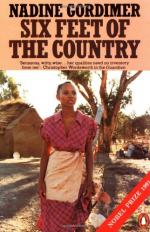|
This section contains 620 words (approx. 2 pages at 400 words per page) |

|
Six Feet of the Country Summary & Study Guide Description
Six Feet of the Country Summary & Study Guide includes comprehensive information and analysis to help you understand the book. This study guide contains the following sections:
This detailed literature summary also contains Quotes and a Free Quiz on Six Feet of the Country by Nadine Gordimer.
The following version of this short story was used to create the guide: Gordimer, Nadine. "Six Feet of the Country." Six Feet of the Country. Penguin Books, 1986. Pages 7 - 20.
Nadine Gordimer's short story, "Six Feet of the Country," is told from an unnamed white man’s first person point of view. The story employs an atypical structure, and is told in the past tense. The following summary adheres to a more linear mode and relies primarily on the present tense.
When the first person narrator and his wife, Lerice, first decide to move out of Johannesburg, South Africa, and onto their newly acquired farm, the narrator hopes that something will change between them. Their marriage has been defined by tension, and he and Lerice both want farm life to grant them quiet and peace.
Not long after moving 10 miles out of the city, however, the narrator realizes his wife likes living on the farm, while he does not. He had assumed she would soon grow tired of the country, and return to her endeavors as an amateur actor. Instead, she begins investing in the land, the animals, and their farmhands’ lives.
Meanwhile, the narrator continues working in the city as a travel agent, only spending time on the farm in the evenings and on weekends. Sometimes he notices the beauty of the land and tries convincing himself the move was a wise decision. He feels especially convinced of this when they have guests. While their guests whine about tensions in Johannesburg, the narrator declares how lucky he and Lerice are to have escaped.
The tensions his guests are talking about have to do with apartheid, and the violent racial dynamics it has inspired in the city. In the country, the narrator thinks he and his wife have formed a new and better relationship with black citizens, particularly the native South Africans who work for them.
One night, one of their farmhands, Albert, knocks on their bedroom window, asking for help. The narrator follows him out to the workers' huts. When they arrive at another farmhand Petrus's hut, the narrator is shocked to see the dead body of a young man. Petrus says it is his brother.
Petrus's brother walked from neighboring Rhodesia to South Africa in search of work. He got sick along the way, and tried recovering with Petrus. The workers had been afraid to ask the narrator and Lerice for help because the boy was an illegal immigrant. He died three days after his arrival.
Lerice is upset Petrus did not feel he could trust her and her husband. The narrator is most bothered that he has to deal with the situation at all.
Afterwards, he communicates with the health authorities and the police. The authorities dispose of the body. When Petrus finds out, he begs the narrator to help him recover the body. His father is coming and they want to have a funeral. Petrus scrounges up 20 pounds to pay for the exhumation. The narrator scoffs, believing the whole ordeal is a waste of time, money, and energy.
Roughly two weeks later, the narrator plays golf on the property while watching Petrus and his family and friends carry the boy's coffin towards the nearby graveyard. Suddenly, the group becomes upset. The narrator rushes over to see what is happening. They have discovered the body in the coffin is not Petrus's brother.
Though the narrator tries getting the correct body back, Petrus's brother is lost forever. Neither the narrator nor Lerice can recover the money Petrus paid for the wrong body's exhumation. Before Petrus's father leaves, Lerice gives him an old suit. The narrator sees the suit as a worthy compensation for his loss.
Read more from the Study Guide
|
This section contains 620 words (approx. 2 pages at 400 words per page) |

|



